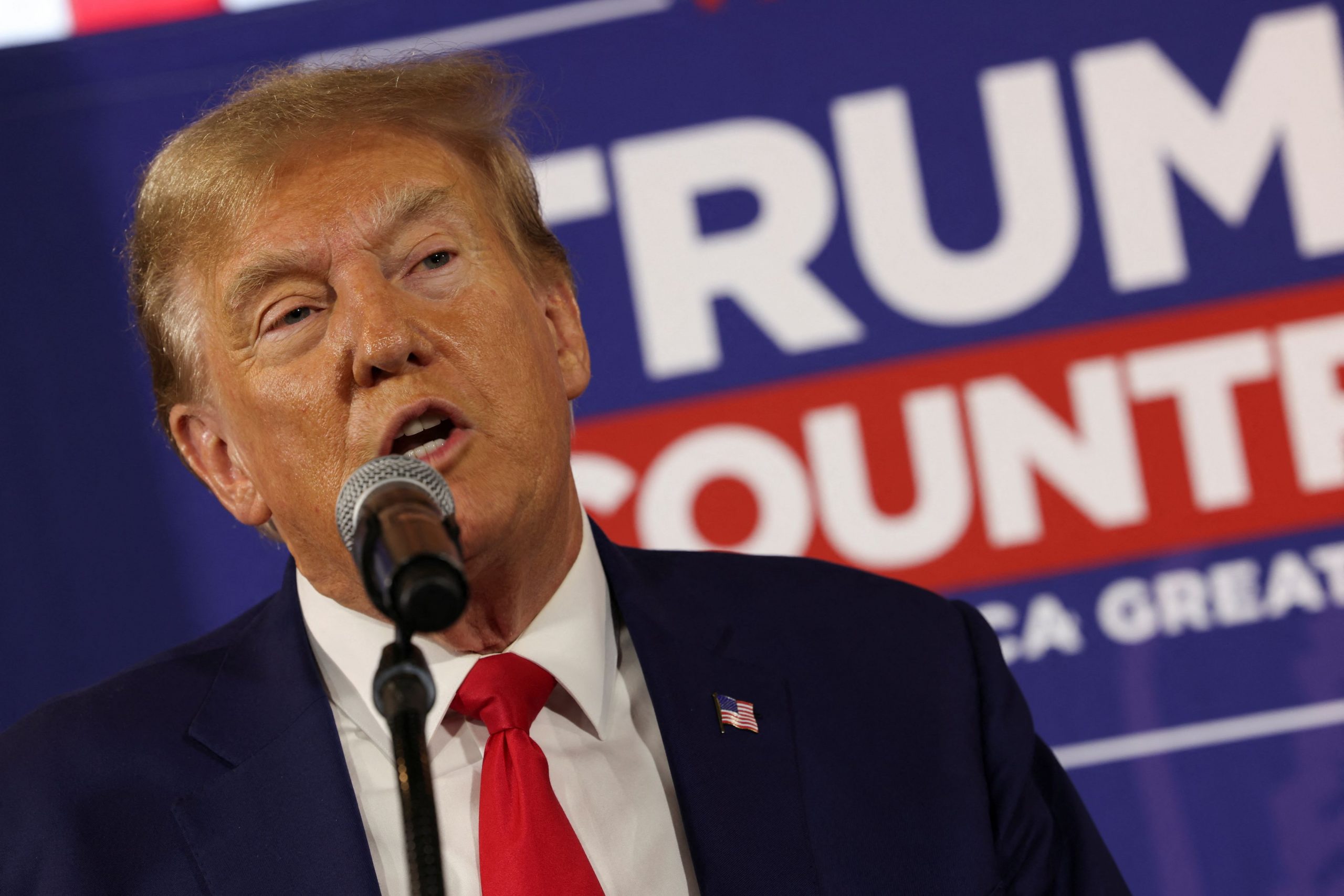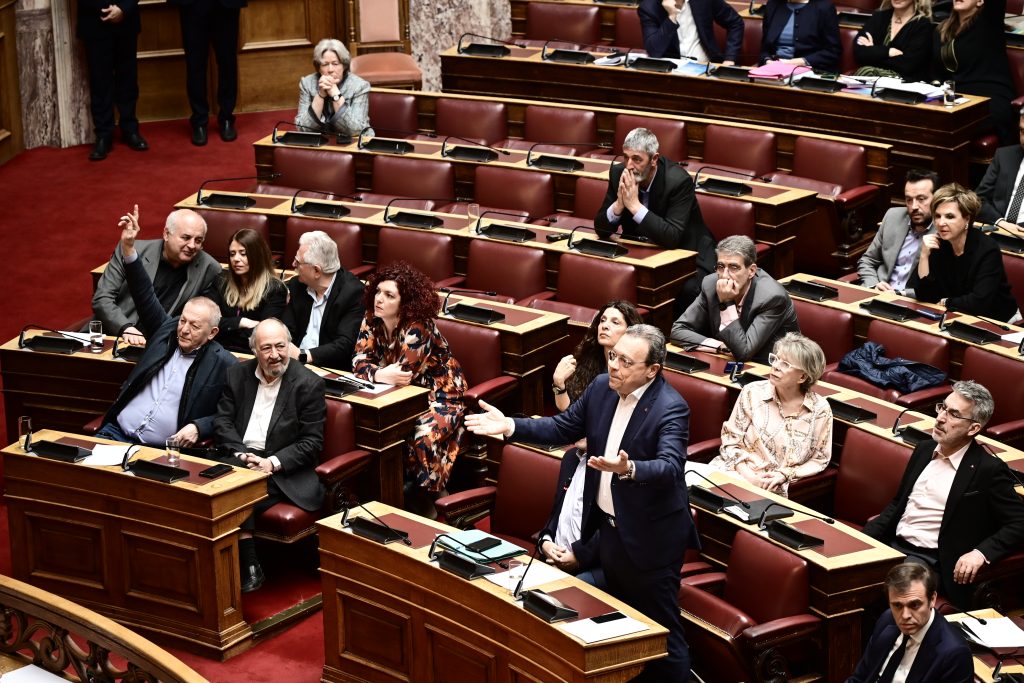WASHINGTON—As he campaigns to retake the White House, Donald Trump has increasingly tossed aside the principles of limited government and local control that have defined the Republican Party for decades.
The former president is laying plans to wield his executive authority to influence school curricula, prevent doctors from providing medical interventions for young transgender people and pressure police departments to adopt more severe anticrime policies. All are areas where state or local officials have traditionally taken the lead.
He has said he would establish a government-backed anti-“woke” university, create a national credentialing body to certify teachers “who embrace patriotic values” and erect “freedom cities” on federal land. He has pledged to marshal the power of the government to investigate and punish his critics.
It is a governing platform barely recognizable to prior generations of Republican politicians, who campaigned against one-size-fits-all federal dictates and argued that state legislators, mayors and town halls were best positioned to oversee their communities. While many of his proposals would be difficult to achieve, the second-term agenda outlined by Trump could require waves of new federal intervention, even as he calls for firing government workers, neutering the “deep state” and cutting regulations.
“If Trump wins, the days of small government conservatism may be over,” said Lanhee Chen, a fellow at Stanford University’s Hoover Institution who served as the policy director of Mitt Romney’s 2012 presidential campaign.

A transformed GOP Agenda
For Trump, a second presidential term would mark the culmination of a yearslong campaign to reshape the party in his image, moving away from the core ideals espoused for decades by Ronald Reagan, Barry Goldwater, William F. Buckley and other idols of the conservative movement. Instead, Trump has rallied his millions of supporters in part by tapping into the cultural and social grievances that animate the conservative base.
The rapid shift in the priorities of the party has led to something of an existential crisis for longtime Republican officials. They have privately said the GOP of today is unrecognizable from even a decade ago, when many Republicans were campaigning on leaner government, balanced budgets, entitlement reform and free trade.
As president, Trump presided over four straight years of rising annual deficits, signing bipartisan budget agreements that boosted federal spending. He launched a trade war with China. And earlier this year, he warned his party not to “cut a single penny from Medicare or Social Security.”
“What do we stand for as Republicans? The orthodoxy is a little bit upside down,” said Margaret Spellings, who led the Education Department and the Domestic Policy Council during the George W. Bush administration.
Fighting the culture wars
The former president’s allies contend that the party needed shaking up, and that Republicans were losing elections because they misjudged what American voters wanted. They contend that government intervention is a necessary corrective to what they view as overreach at the hands of liberals promoting their own ideas on diversity and education.
Brooke Rollins—a Trump White House official who now leads the America First Policy Institute, a think tank run by former Trump aides—argued that the majority of the public thinks that “the federal government [should] ensure that it is working on behalf of the people.”
“When local or state government drifts away from that, either unintentionally or intentionally, then I think that the vision is with an America First approach that the federal government will lean in and pull freedom back to where it should be,” Rollins said.
A Trump campaign spokesman didn’t respond to a request for comment.
Trump’s approach has won partial buy-in from powerful conservative groups. Heritage Foundation President Kevin Roberts said conservative policy has to “account for the reality of the damage that has been imposed by the culture war.”
Though Trump’s education policy proposals break with the longstanding conservative belief that schools should be controlled locally, Roberts argued that exceptions should be made to ban critical race theory from school curricula, for example, or to ensure that transgender athletes compete on teams only of the sex they were assigned at birth.
“For two generations, conservatives have said, ‘Let’s apply the principle of subsidiarity’ ”—the idea that decisions should be made at the most appropriate local level, Roberts said. “And what has happened is that federal money changed how those local entities, particularly local school boards, make decisions. It’s worse than that—it’s corrupted and diseased it. And so any conservative running for office would want to correct that.”
Redefining conservatism
Some Republicans warn that Trump is going too far.
Judd Gregg of New Hampshire, a former Republican senator and governor, said Trump’s ideas were “antithetical to conservative thought and conservative history.” The federal government funds only a small portion of elementary and secondary education and yet Trump would use that money to “mandate 100% of the control.”
“That’s not conservative—but that’s the point: Trump is not a conservative,” said Gregg, who has endorsed former South Carolina Gov. Nikki Haley’s presidential bid. “He’s an iconoclastic populist, and his views have no relation to any philosophical views. They’re all related to his personal views, which are built on all sorts of different platforms depending on what he sees in the mirror in the morning.”
Gregg said he found it ironic that Trump was proposing a muscular use of federal authority over schools, given that conservatives had once attacked Gregg for overreaching with a landmark, bipartisan bill he co-authored, known as No Child Left Behind. That bill, signed by then-President George W. Bush in 2002, required reading and math assessment tests for students in certain grades. Schools faced sanctions for failing to move more students toward proficiency, but the states, and not the federal government, set the standards.
Even some of Trump’s allies have privately expressed doubts about several of his proposals. Several former Trump administration officials said they were skeptical of the feasibility of the former president’s plan, announced in a video message on his social-media platform last month, to establish an “American Academy” funded by “taxing, fining and suing” what he calls “excessively large” private university endowments. Trump pitched the government-backed free online school as an alternative to the current higher education system. “There will be no wokeness or jihadism allowed,” Trump said.
Roberts, Heritage’s president, said he “loves” the university plan but opposes Trump’s proposal for federal certification of teachers. “I hate it. It’s a terrible idea,” he said. Heritage wants to end teacher certification altogether. As with many of his second-term proposals, Trump has offered little detail about the plan other than to say he would create a “credentialing body to certify teachers who embrace patriotic values and support the American Way of Life.”
Using government to counter liberalism
Trump’s platform is an expansive example of the reorientation among some within the GOP more broadly in favor of a more active federal government. In Congress, some Republicans have pushed for such federal measures as caps on credit-card interest rates, social-media regulations and worker protections in contracts that fit awkwardly with the party’s business-oriented impulses.
Like Trump, several other GOP presidential candidates say that an aggressive use of federal authority is needed to push back against a liberal social agenda that they say has taken hold in schools, academia, the media and corporate boardrooms. Florida Gov. Ron DeSantis has argued that “old-guard corporate Republicanism isn’t up to the task.”
The idea is an extension of one advanced in an influential 2016 essay, “The Flight 93 Election,” by Michael Anton, who went on to be a Trump national security aide. He said that the U.S. was “headed off a cliff” because of liberal dominance of institutions, and traditional conservatives weren’t prepared for the seriousness of the fight.
Trump’s governing philosophy is at times difficult to decipher. Unlike with past presidents, his résumé doesn’t include years of government service during which he staked out consistent positions on issues of the day. People who have worked for him said he is unconcerned with hewing to timeworn party rules, and the former president has privately and publicly expressed disdain for Republican standard-bearers such as Bush.
“Certain things hit him viscerally, and he wants to fix them personally. He thinks Republicans have been too passive in the face of a lot of these issues,” said Joe Grogan, Trump’s former Domestic Policy Council director. “He’s totally nondoctrinaire. He’s definitely willing to throw the old rules away.”
Trump’s unorthodox and unpredictable approach to governing continued throughout his White House tenure, and a second term would push that approach further.
In dozens of policy proposals outlined in speeches and on his campaign website, Trump has called for vastly expanding the power of the presidency, shifting authority away from federal agencies and to himself. He has said he would slash major federal programs and revive a mandate from his first term to eliminate two regulations for every new one that is put in place.
“For anyone to say he loves big government—that’s just wrong,” Rollins said.
More government means more bureaucracy
Implementing many of his other proposals could require building additional layers of government bureaucracy, some of which could overrule or duplicate existing state and local efforts. Credentialing teachers on the federal level could mean creating a new government body that would complicate existing state certification efforts.
Setting up a new government-backed university could require a labyrinthine system of government contracts to hire instructors and staff. Trump’s proposals to direct the government to investigate everything from MSNBC to hospitals could require hiring additional lawyers and other employees to carry out the probes.
Other vaguely defined ideas—like Trump’s proposals to establish a Truth and Reconciliation Commission to declassify and publish documents on “Deep State spying” and an independent auditing system to monitor U.S. intelligence agencies—would also likely require new government programs.
Washington policy-making veterans said many of Trump’s plans are unlikely to come to fruition even if he wins a second term, citing logistical and financial hurdles, potential opposition from Congress and likely court challenges.
The former president’s proposals “might make for good stump speech fodder (at least for his MAGA base), but are miles from the real world of programs and policies,” Michael Petrilli, an education policy analyst and the president of the Thomas B. Fordham Institute, said in an email. “The point of these proposals is to take sides in the culture war, not to present a governing agenda.”
Write to Andrew Restuccia at andrew.restuccia@wsj.com and Aaron Zitner at aaron.zitner@wsj.com



